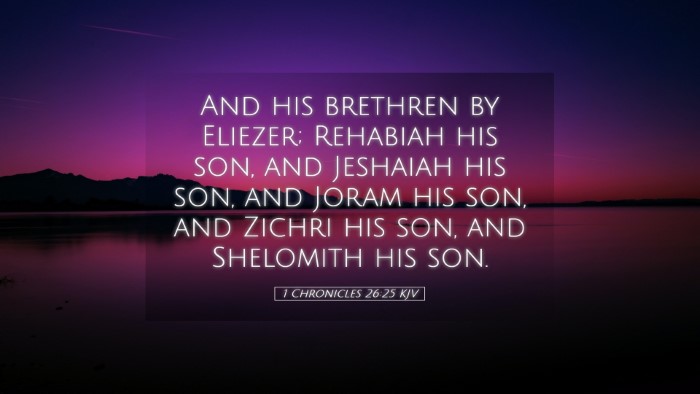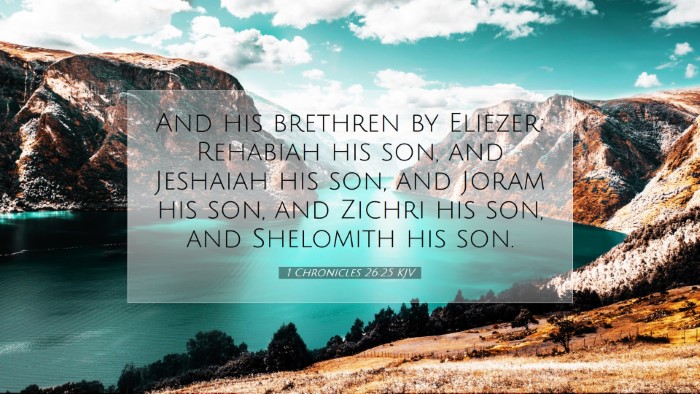Commentary on 1 Chronicles 26:25
Verse: “And his brethren, by Eliezer, were three hundred. And the chief of them was Obed-edom.”
Introduction
This verse appears within the context of the organization of the Levites and the porters appointed to guard the gates of the house of the Lord. It reflects the administrative order set by King David, showcasing the roles and responsibilities assigned to the Levites, particularly to the house of Obed-edom.
Background and Context
The books of Chronicles focus significantly on the Levitical duties, the assembled community of Israel, and the proper worship of God. The genealogy of the Levites, particularly those serving at the temple, is a central theme in these chapters. This chapter elaborates on the divisions appointed for service, demonstrating the systematic arrangement of worship and service in ancient Israel.
Insights from Matthew Henry
Matthew Henry emphasizes the importance of order and duty in the service of God. He notes that the organization of the Levitical priests and porters indicates a structured approach to worship.
- Divine Order: Henry suggests that God is pleased with order in His house. The efficiency with which God's work is carried out is a reflection of His glory.
- Role of Obed-edom: Obed-edom, who had previously housed the Ark of the Covenant, is highlighted. His elevation to a chief position speaks volumes about God's favor and the blessing that came upon his household.
- Brotherhood and Service: Henry points out the collaborative nature of the Levitical duties. The brothers serving together under Obed-edom symbolize unity in spiritual service.
Insights from Albert Barnes
Albert Barnes provides a detailed exposition on the significance of the numbers and names listed in this chapter.
- Significance of Numbers: Barnes remarks that the mention of “three hundred” indicates a substantial number of Levites under Obed-edom’s authority, signifying the importance of his role.
- Obed-edom's legacy: Barnes discusses the lineage of Obed-edom, underlining the generational blessings upon those who serve faithfully in God's house. He draws a connection to the New Testament, showcasing the enduring impact of faithful service.
- Spiritual Lessons: Barnes articulates that the organization of the Levites serves as a reminder for the church today to maintain order and hierarchy in ministry for effective worship.
Insights from Adam Clarke
Adam Clarke's commentary delves deeper into the individual roles and their significance within the temple service.
- Obed-edom's role: Clarke emphasizes the unique calling of Obed-edom, illustrating how he became a testimony to the blessings of God’s presence. His position is a reward for his prior faithfulness.
- Tribal Affiliation: Clarke notes the tribal distinctions among the Levites, elaborating on their specific duties regarding temple maintenance and worship. Each division had its appointed tasks, enhancing the overall function of worship.
- Application to Modern Ministry: Clarke suggests the necessary principle of recognizing and appointing leaders within various functions of the church today, maintaining reverence and order similar to that of the ancient temple.
Theological Implications
The organization of the priests and Levites in 1 Chronicles 26:25 provides significant theological insights relevant for contemporary readers.
- God's Desire for Order: The emphasis on organization within God’s house underlines the theological principle that God values orderliness and purpose in worship, which can lead to a more profound community experience.
- Leadership and Service: The acknowledgment of Obed-edom's chief role serves as a reminder of the importance of faithful leadership and its generational impacts, which is an essential aspect of ecclesiastical leadership today.
- Unity in the Body of Christ: The collaborative efforts of these brethren can be seen as a typological reflection of the unity expected within the Church, emphasizing the need for shared responsibility among believers in worship and service.
Conclusion
1 Chronicles 26:25, while seemingly a simple record of names and numbers, offers profound insights into the nature of worship, the importance of structure, and God’s blessings on faithful service. For pastors, scholars, and students of theology, this verse serves as an enduring reminder of the importance of proper order, commitment, and the recognition that God rewards those who diligently serve Him.


